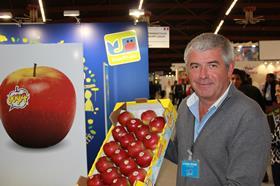
French apple supplier Blue Whale has begun exporting commercial volumes of Joya apples to the UK for the first time in a bid to replace import volumes of southern hemisphere braeburn.
The topfruit giant plans to step up its production of the Cripps Red variety from 4,000 tonnes in 2017 to 15,000t in five years time, with exports of 1,500t destined for two undisclosed UK supermarkets this season.
Blue Whale began growing the variety three years ago, sending trial shipments to the UK, but 2017 will be the first year that it supplies commercial volumes of Cripps Red under the Joya brand.
The company’s aim is to give British multiples the opportunity to import apples grown closer to home rather than sourcing braeburn from South Africa and New Zealand. And this would help bridge the gap between the end of the English braeburn season in April and start of the northern hemisphere Pink Lady season in November.
The late-season Cripps Red variety is harvested in the autumn.
Sourcing apples from France instead of further afield during the off-season will make imports easier to manage, reduce risk and potentially improve fruit quality, according to Blue Whale’s export manager Sylvain Brard.
“We understand that any customer in the world – especially in Europe – wants to have varieties grown close to them instead of importing fruit from all over the world,” he said. “With Joya we see the opportunity to introduce supply from France, which is only one or two days away from the UK.”
In a bid to bolster the French growing season, Blue Whale is also increasing production of Pink Lady by increasing plantings of the main Cripps Pink clone Rosy Glow, which now accounts for 90 per cent of its Pink Lady volumes.
“Because production is increasing, I think that in two to three years time we will be able to supply high-quality Pink Lady to the UK until the end of July,” said Brard. “At the moment we are finishing in mid-June, but two years ago we were finishing Pink Lady mid-May. That’s the evolution.'
Brard also hopes this will help improve the quality of apples on the UK market towards the end of the northern hemisphere season.
“In the UK people are always upset about fruit quality in the early part of the southern hemisphere season but in future we will be able to guarantee our UK customers the best quality fruit until the end of July,” he added.



